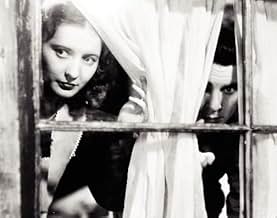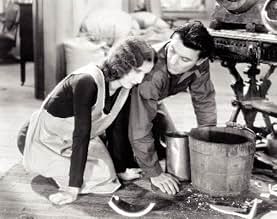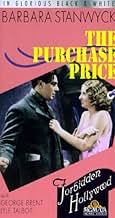AVALIAÇÃO DA IMDb
6,4/10
2 mil
SUA AVALIAÇÃO
Adicionar um enredo no seu idiomaA torch singer becomes a farmer's mail-order bride.A torch singer becomes a farmer's mail-order bride.A torch singer becomes a farmer's mail-order bride.
- Direção
- Roteiristas
- Artistas
Mae Busch
- Queenie - Girl on Train
- (não creditado)
Nick Copeland
- Skins' Pal at Shivaree
- (não creditado)
Mike Donlin
- Tom Buchanan - Man at Shivaree
- (não creditado)
Harrison Greene
- Man in Hotel Lobby
- (não creditado)
Crauford Kent
- A.C. Peters - The Banker
- (não creditado)
Matt McHugh
- Waco - Fields' Henchman
- (não creditado)
John 'Skins' Miller
- Skins - The Accordion Player
- (não creditado)
Carlyle Moore Jr.
- Hotel Desk Clerk
- (não creditado)
Edmund Mortimer
- Dance Extra
- (não creditado)
William H. O'Brien
- Waiter in Opening Nightclub Scene
- (não creditado)
Henry Otho
- Extra in Beer Hall and at Shivaree
- (não creditado)
- Direção
- Roteiristas
- Elenco e equipe completos
- Produção, bilheteria e muito mais no IMDbPro
Avaliações em destaque
If you stop to think about the actual story you'll realise that it's the most ridiculous thing you've ever seen. Fortunately William Wellman directs this at such breakneck speed you don't have time to stop - you're whisked along on the Wellman express.
That all this can happen in 68 minutes is crazy but this was Warner's specialty in the early thirties. They were brilliant at it and this is a great example. It's not a fantastic picture but it is so typical of those fast moving features of pure entertainment Darryl Zanuck knew his audiences would lap up. If good quality early thirties movies are your thing, this will tick your boxes. Even though the setting isn't the usual mean streets of New York, it's still got all the usual ingredients.
A common ingredient of pre-code films that's present in this is the overriding importance of marriage. Although in pictures like this it's the single most vital thing in the world for a girl - which must have reflected reality, it seems completely unimportant who they marry as long as they can provide food and shelter. It's irrelevant whether he's a gangster, a decrepit pensioner or in this case, a complete stranger who advertised for a wife (essentially a housekeeper) in an agency. Disturbingly, mail order brides are still around today. Anyway...
One of those other usual key ingredients is George Brent. He's his usual dull self but for a change, that bland personality is suited to this role. Fortunately 'the other man' in the love triangle is Lyle Talbot who always adds some slightly shady charisma. These two however are definitely second fiddle to the absolute star of this picture, Barbara Stanwyck.
She effortlessly melds her gangster-moll persona to devoted farmer's wife as though it's the most transition in the world. Were this role be played by a lesser actress (and directly a lesser director) it could have been a joke picture because the premise is so stupid but she (and Wellman) make it seem completely believable and therefore thoroughly enjoyable.
As in all her thirties pictures (apart from the monstrous Stella Dallas) despite not having the classic Hollywood looks, she inexplicably oozes enough sex appeal to fuel the planet for a hundred years. She certainly had 'it.' This isn't one of her best films but it's still pretty decent - and she's absolutely lovely in it.
That all this can happen in 68 minutes is crazy but this was Warner's specialty in the early thirties. They were brilliant at it and this is a great example. It's not a fantastic picture but it is so typical of those fast moving features of pure entertainment Darryl Zanuck knew his audiences would lap up. If good quality early thirties movies are your thing, this will tick your boxes. Even though the setting isn't the usual mean streets of New York, it's still got all the usual ingredients.
A common ingredient of pre-code films that's present in this is the overriding importance of marriage. Although in pictures like this it's the single most vital thing in the world for a girl - which must have reflected reality, it seems completely unimportant who they marry as long as they can provide food and shelter. It's irrelevant whether he's a gangster, a decrepit pensioner or in this case, a complete stranger who advertised for a wife (essentially a housekeeper) in an agency. Disturbingly, mail order brides are still around today. Anyway...
One of those other usual key ingredients is George Brent. He's his usual dull self but for a change, that bland personality is suited to this role. Fortunately 'the other man' in the love triangle is Lyle Talbot who always adds some slightly shady charisma. These two however are definitely second fiddle to the absolute star of this picture, Barbara Stanwyck.
She effortlessly melds her gangster-moll persona to devoted farmer's wife as though it's the most transition in the world. Were this role be played by a lesser actress (and directly a lesser director) it could have been a joke picture because the premise is so stupid but she (and Wellman) make it seem completely believable and therefore thoroughly enjoyable.
As in all her thirties pictures (apart from the monstrous Stella Dallas) despite not having the classic Hollywood looks, she inexplicably oozes enough sex appeal to fuel the planet for a hundred years. She certainly had 'it.' This isn't one of her best films but it's still pretty decent - and she's absolutely lovely in it.
Of course this delicious tour-de-force is totally incredible... but WOW! You can't take your eyes off the screen in case Wellman gives his heroine whiplash as she moves from plushly-kept woman in Manhattan to mail-order farmer's bride in North Dakota. From take-out at Tiffany's to hauling coal nuggets 20 miles through a blizzard. From igniting the lust in men with her daring chanteusing to putting out the fire villains set to her and hubby George Brent's last-hope crop of wheat. All in just over 60 minutes!
Sometimes I think you just have to be in the mood for certain films. This may have been one of those times. "The Purchase Price" from 1932, largely thanks to Barbara Stanwyck, is actually a very sweet film.
Stanwyck plays Joan, a torch singer, unhappy with her present life and the racketeer, Eddie Fields (Lyle Talbot) with whom she's involved. When she finds out that someone has used her photo and sent it off to be a mail-order bride, Joan decides to show up in person and takes off.
She ends up in farm country with Jim Gilson (George Brent) who's in debt up to his eyebrows. However, over the years, he has developed an excellent grain seed - if he can stave off the creditors until the next planting season, he'll be okay.
To Joan's credit, she settles in, determined to make him a good wife and to be a good neighbor, and she falls in love with Jim. When her ex-beau shows up, Jim jumps to some wrong conclusions.
Barbara Stanwyck is great in this, giving a warm, sincere performance. She is glamorous in the first few scenes (though boy, she can't sing), and she remains sexy and pretty even plainly dressed on the farm, causing a lot of men to notice her and make dumb old Jim jealous.
This is a different kind of role for George Brent, who soon would be well-dressed, mustached, and sophisticated as he played opposite Bette Davis. Here he's an oaf.
The movie is short and moves quickly. Stanwyck's performance helps give a freshness to a story that was old even back in 1932.
Stanwyck plays Joan, a torch singer, unhappy with her present life and the racketeer, Eddie Fields (Lyle Talbot) with whom she's involved. When she finds out that someone has used her photo and sent it off to be a mail-order bride, Joan decides to show up in person and takes off.
She ends up in farm country with Jim Gilson (George Brent) who's in debt up to his eyebrows. However, over the years, he has developed an excellent grain seed - if he can stave off the creditors until the next planting season, he'll be okay.
To Joan's credit, she settles in, determined to make him a good wife and to be a good neighbor, and she falls in love with Jim. When her ex-beau shows up, Jim jumps to some wrong conclusions.
Barbara Stanwyck is great in this, giving a warm, sincere performance. She is glamorous in the first few scenes (though boy, she can't sing), and she remains sexy and pretty even plainly dressed on the farm, causing a lot of men to notice her and make dumb old Jim jealous.
This is a different kind of role for George Brent, who soon would be well-dressed, mustached, and sophisticated as he played opposite Bette Davis. Here he's an oaf.
The movie is short and moves quickly. Stanwyck's performance helps give a freshness to a story that was old even back in 1932.
This is sold as "pre-Code," as if there will something risqué or shocking, but certainly by today's standards -- or lack thereof -- and even by those of the era, there is nothing to bother your grandma or even your (reasonable) preacher.
There is something, though, to excite the movie-lover: Barbara Stanwyck's performance.
Apparently in real life she was a pretty tough cookie, and certainly she played some hard women in many of her films.
In "The Purchase Price" her character refers to herself as having maintained some sort of a reputation and in fact she comes across as a very nice, even admirable person.
She certainly looked good, with a gentle strength, or strong gentleness, poking out of the chorus girl/mistress persona.
The story, though, never does make much sense, and why the people did what they did, except for the character played by Lyle Talbot -- in a great role for him, and excellently played -- is not clear.
One more glaring error: North (brrrr) Dakota doesn't have any hills, and the shots of snow-capped peaks showed that wherever this film was shot, it sure wasn't North (brrrr) Dakota, you betcha.
One scene of plowing showed the genuine agoraphobic look of that state, where neither hills nor even trees are native. Except for cottonwoods along the creeks and rivers, what trees there are in North (brrrr) Dakota have had to be brought in from the real world.
Plus North (brrrrr) Dakota drunks and brawlers are not Irish and Scots, as this movie implies, but Poles and Czechs and Germans, sometimes even Norwegians, unless they are Lutherans then, of course, they don't drink or brawl. And if you don't believe me, ask their preachers.
Anyway, watch this for Stanwyck and suspend your disbelief about all the rest. She is worth spending your time.
There is something, though, to excite the movie-lover: Barbara Stanwyck's performance.
Apparently in real life she was a pretty tough cookie, and certainly she played some hard women in many of her films.
In "The Purchase Price" her character refers to herself as having maintained some sort of a reputation and in fact she comes across as a very nice, even admirable person.
She certainly looked good, with a gentle strength, or strong gentleness, poking out of the chorus girl/mistress persona.
The story, though, never does make much sense, and why the people did what they did, except for the character played by Lyle Talbot -- in a great role for him, and excellently played -- is not clear.
One more glaring error: North (brrrr) Dakota doesn't have any hills, and the shots of snow-capped peaks showed that wherever this film was shot, it sure wasn't North (brrrr) Dakota, you betcha.
One scene of plowing showed the genuine agoraphobic look of that state, where neither hills nor even trees are native. Except for cottonwoods along the creeks and rivers, what trees there are in North (brrrr) Dakota have had to be brought in from the real world.
Plus North (brrrrr) Dakota drunks and brawlers are not Irish and Scots, as this movie implies, but Poles and Czechs and Germans, sometimes even Norwegians, unless they are Lutherans then, of course, they don't drink or brawl. And if you don't believe me, ask their preachers.
Anyway, watch this for Stanwyck and suspend your disbelief about all the rest. She is worth spending your time.
The appeal of this somewhat run-of-the-mill film is Barbara Stanwyck in an early display of her mega-watt star power and her ability to turn mediocre material into something special.
Her character doesn't make much sense: a nightclub singer from the city who wants to get away from the bootlegger boyfriend hounding her and so agrees to an arranged marriage with a farmer up in the wilds of North Dakota! The bootlegger (played by Lyle Talbot) isn't threatening or abusive, so one wonders why Stanwyck needs to go to such great lengths to avoid him -- keep wondering, because the movie never explains it. But if you can swallow that, then you can easily swallow the fact that this urban good-time gal seems to know all about how to run a farm.
Which brings me back to Stanwyck. The movie's premise isn't remotely plausible, but Stanwyck somehow makes it so through the confidence of her performance. I really think she could make anything worth sitting through just for the pleasure of watching her.
The film does provide an interesting look at what farm life in the early days of the 1930s was like, a lifestyle I've only seen recreated in more modern-day movies.
Grade: B-
Her character doesn't make much sense: a nightclub singer from the city who wants to get away from the bootlegger boyfriend hounding her and so agrees to an arranged marriage with a farmer up in the wilds of North Dakota! The bootlegger (played by Lyle Talbot) isn't threatening or abusive, so one wonders why Stanwyck needs to go to such great lengths to avoid him -- keep wondering, because the movie never explains it. But if you can swallow that, then you can easily swallow the fact that this urban good-time gal seems to know all about how to run a farm.
Which brings me back to Stanwyck. The movie's premise isn't remotely plausible, but Stanwyck somehow makes it so through the confidence of her performance. I really think she could make anything worth sitting through just for the pleasure of watching her.
The film does provide an interesting look at what farm life in the early days of the 1930s was like, a lifestyle I've only seen recreated in more modern-day movies.
Grade: B-
Você sabia?
- CuriosidadesDuring the wheat-burning scene a stand-in was used instead of Barbara Stanwyck, but she didn't think the stand-in acted as the character so Stanwyck decided to play it herself. This resulted in her getting some burns on her legs, but she never complained.
- Erros de gravaçãoWhen Barbara Stanwyck gets off the train in North Dakota the terrain is very mountainous. North Dakota is on the Great Plains - very flat.
- Citações
Eddie 'Ed' Fields: Ya daffy little tahmata, I'm bugs about ya. I'd marry ya myself, if I wasn't already married.
- ConexõesFeatured in Barbara Stanwyck: Fire and Desire (1991)
- Trilhas sonorasTake Me Away
(1932) (uncredited)
Music by Peter Tinturin
Lyrics by Sidney Clare and Charles Tobias
Played during the opening credits and at the end
Sung by Barbara Stanwyck at the nightclub
Played as background music often
Principais escolhas
Faça login para avaliar e ver a lista de recomendações personalizadas
- How long is The Purchase Price?Fornecido pela Alexa
Detalhes
- Data de lançamento
- País de origem
- Idioma
- Também conhecido como
- The Purchase Price
- Locações de filme
- Empresa de produção
- Consulte mais créditos da empresa na IMDbPro
Bilheteria
- Orçamento
- US$ 202.000 (estimativa)
- Tempo de duração
- 1 h 8 min(68 min)
- Cor
- Mixagem de som
- Proporção
- 1.37 : 1
Contribua para esta página
Sugerir uma alteração ou adicionar conteúdo ausente



































